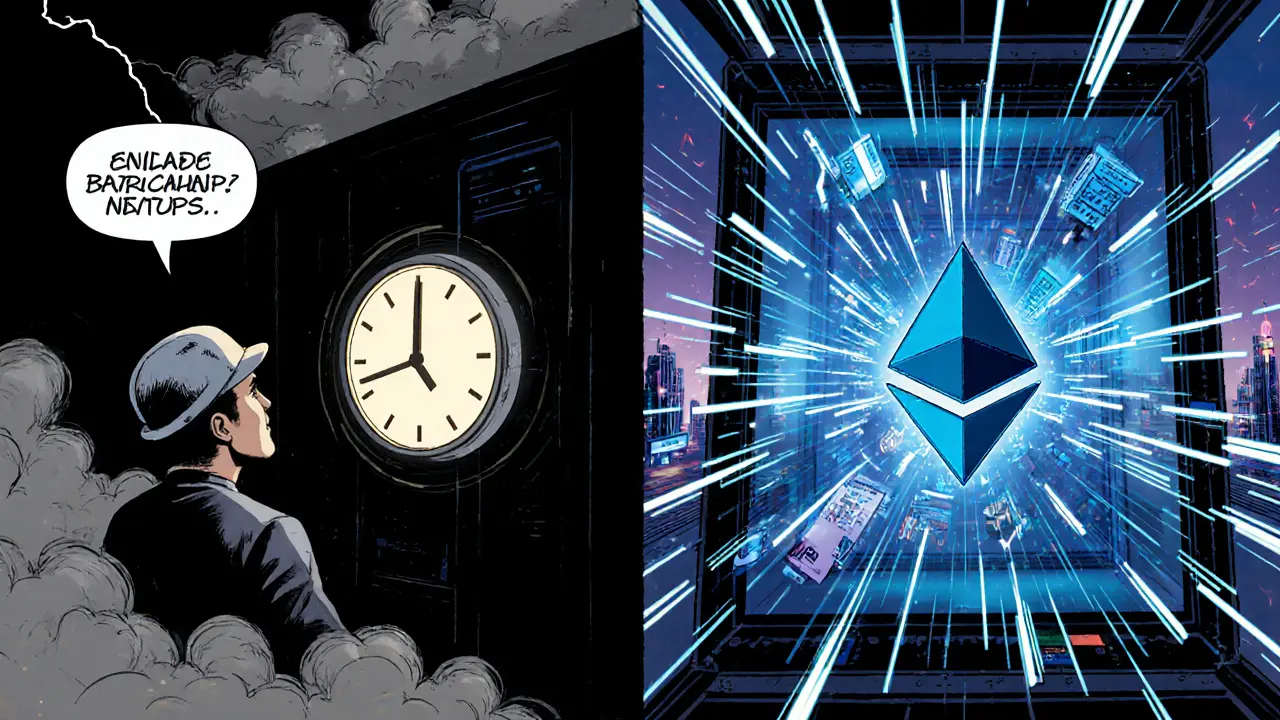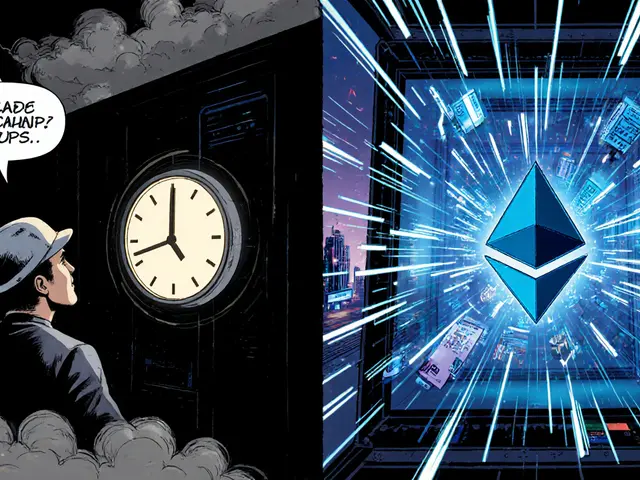Block Time Calculator
Time Period Input
Enter a time period to calculate blocks produced by both networks
Key Metrics
Transaction Finality
How long until your transaction is secure?
Bitcoin requires 6 confirmations for strong security (about 60 minutes), while Ethereum achieves finality in minutes due to its Proof of Stake mechanism.
For Bitcoin, exchanges typically require 6 confirmations for deposits. For Ethereum, they usually require 2-6 confirmations.
Results
Bitcoin Blocks
0
Average 10 minutes per block
Ethereum Blocks
0
Average 12 seconds per block
Estimated Transactions
0
Based on 4.6 TPS
Estimated Transactions
0
Based on 20.6 TPS
For reference: Bitcoin processes about 7 transactions per second at maximum capacity, while Ethereum handles up to 35 transactions per second on-chain.
When you send Bitcoin or Ethereum, how long do you wait for it to confirm? For Bitcoin, it’s usually 10 minutes. For Ethereum, it’s often less than 15 seconds. That’s not a glitch-it’s by design. The difference in block time between these two networks shapes everything from how you use them to why they exist in the first place.
Why Block Time Matters More Than You Think
Block time isn’t just a technical detail. It’s the heartbeat of a blockchain. Every time a new block is added, transactions inside it become part of the permanent record. Shorter block times mean faster payments. Longer ones mean more security. Bitcoin chose slowness on purpose. Ethereum chose speed-and changed its entire structure to get there.Bitcoin’s 10-minute block time was set by Satoshi Nakamoto in 2009. Back then, internet connections were slow, and computers weren’t synced globally. A 10-minute window gave miners and nodes enough time to share new blocks before the next one was mined. If blocks came too fast, networks would split. Miners would waste work. Transactions would get stuck. Bitcoin’s design accepted slower speeds to avoid chaos.
Ethereum, launched in 2015, had different goals. It wasn’t just about moving money. It was about running apps-DeFi, NFTs, smart contracts-that need to respond quickly. A 10-minute wait for a trade to settle? Not practical. So Ethereum started with 12-15 second blocks. After switching to Proof of Stake in September 2022, it locked in at 12 seconds with near-perfect consistency.
The Numbers Don’t Lie: Speed Compared
Here’s what real data shows as of late 2024:- Bitcoin: Average block time = 602.4 seconds (just over 10 minutes)
- Ethereum: Average block time = 12.1 seconds
That’s 50 times faster. Ethereum processes a new block every 12 seconds. Bitcoin waits 10 minutes. In one hour, Ethereum adds 300 blocks. Bitcoin adds 6.
This difference affects transaction throughput:
- Bitcoin: ~4.6 transactions per second (TPS) real-time, max 7.5 TPS
- Ethereum: ~20.6 TPS real-time, max 35.4 TPS
Even the theoretical limits show the gap: Bitcoin can handle 7 TPS at best. Ethereum can handle 120. That’s why Bitcoin needs the Lightning Network to scale for everyday payments, while Ethereum uses rollups like Arbitrum and Optimism to handle millions of daily transactions.
Finality: When Is a Transaction Really Done?
Speed isn’t just about how fast a block is mined. It’s about when you can trust the transaction.Bitcoin recommends waiting for 6 confirmations-6 blocks-to feel safe. At 10 minutes per block, that’s 60 minutes. For high-value transfers like buying a house with Bitcoin, that’s acceptable. For buying coffee? Not so much.
Ethereum, after The Merge, uses cryptographic finality. Once a block is added, it’s nearly impossible to reverse. You only need about 15-20 seconds for strong confidence. For most users, 64 blocks (roughly 13 minutes) is considered fully final. That’s still faster than Bitcoin’s 60 minutes.
Exchanges reflect this. Coinbase reports Bitcoin confirmations take an average of 18.7 minutes. Ethereum? Just 1.3 minutes. That’s why platforms like Uniswap or OpenSea run on Ethereum, not Bitcoin.

Security Trade-Offs: Why Bitcoin Won’t Speed Up
You might wonder: Why doesn’t Bitcoin just switch to 12-second blocks? The answer is simple-it would break.Bitcoin’s security relies on miners having time to propagate blocks across the globe. If blocks came every 12 seconds, as Ethereum’s do, orphaned blocks (or “stale blocks”) would skyrocket. VanEck’s 2025 analysis estimates Bitcoin’s orphan rate would jump from 0.1% to 45%. That means nearly half the mining work done would be wasted. Miners would earn less. Centralization would increase. The whole network would become less secure.
Andreas Antonopoulos put it plainly: “Bitcoin’s 10-minute block time is the optimal trade-off between security, decentralization, and reasonable confirmation times.” It’s not a bug. It’s a feature.
Ethereum’s PoS system makes faster blocks possible because it removes mining competition. Instead of multiple miners racing to solve a puzzle, a single validator is chosen to propose each block. This eliminates the race condition that causes orphaned blocks in Proof of Work. Danny Ryan from the Ethereum Foundation says this deterministic selection “reduces the impact of network latency on chain continuity.”
How Developers Build Around Block Time
If you’re building an app, your choice of blockchain changes everything.Bitcoin developers design for patience. They assume a 10-minute wait. That’s why they built the Lightning Network-a second layer that lets users send payments instantly, off-chain, and settle on Bitcoin only when needed. As of September 2024, there are over 14,000 active Lightning nodes.
Ethereum developers don’t need to build layers for speed. They build for gas fees and congestion. When the network gets busy, gas prices spike. But blocks still come every 12 seconds. That’s why rollups like Arbitrum and Base are so popular-they handle 72% of Ethereum’s transaction volume without slowing down the base chain.
API documentation reflects this too. Coinbase’s developer docs say: use 2-6 confirmations for Ethereum (24-72 seconds). For Bitcoin? 3-6 confirmations (30-60 minutes). Developers know: if you’re on Ethereum, your app can feel real-time. On Bitcoin, it can’t.

What People Actually Use Them For
User behavior confirms the technical divide.On Reddit’s r/Bitcoin, users say: “I use Bitcoin for international wire replacements. The 10-minute wait is fine-it’s for big money.” On r/ethfinance, traders say: “I need sub-minute confirmations to scalp trades on Uniswap. Waiting 10 minutes is a non-starter.”
Statistics back this up:
- 72% of Bitcoin transactions over $100,000 are for settlement-slow, secure, irreversible.
- 89% of DeFi transactions happen on Ethereum because speed is non-negotiable.
Chainalysis reports Bitcoin handles $487 billion in annual volume with 432 million unique addresses. Ethereum? $1.2 trillion with 612 million addresses. More users. More transactions. More apps. All because blocks come faster.
Where Things Are Headed
Bitcoin isn’t changing its block time. Not now. Not ever. The 10-minute interval is baked into its DNA. Upgrades like Taproot and future Schnorr improvements make transactions more efficient within that window-without touching the block time.Ethereum is going further. Danksharding, expected in 2026, will keep the 12-second block time but massively increase data capacity for rollups. Some analysts think Ethereum could drop to 8 seconds by 2027 as infrastructure improves.
Meanwhile, other chains are trying to outpace both. Solana runs at 400-millisecond blocks. But it’s a trade-off: speed can mean centralization risk. Bitcoin and Ethereum aren’t competing to be fastest. They’re designed for different roles.
By 2030, experts predict Bitcoin will dominate high-value, low-frequency transfers. Ethereum and its layer-2 ecosystem will own the high-frequency, medium-value world-DeFi, gaming, social apps, digital ownership. The block time difference won’t disappear. It’ll define their futures.
Why is Bitcoin’s block time 10 minutes?
Bitcoin’s 10-minute block time was chosen by Satoshi Nakamoto to balance security, decentralization, and network propagation. With slower internet and global node sync times in 2009, a longer block interval reduced the risk of chain splits and orphaned blocks. It’s not a limitation-it’s a deliberate security feature.
Can Ethereum’s block time change again?
Ethereum’s block time is currently locked at around 12 seconds under Proof of Stake. While it’s technically possible to adjust, the protocol is designed for stability. Future upgrades like Danksharding won’t change block time-they’ll increase data throughput to handle more transactions per block. A drop to 8 seconds by 2027 is possible but would require major consensus changes.
Which is better for daily payments: Bitcoin or Ethereum?
For direct on-chain payments, neither is ideal. Bitcoin’s 10-minute wait is too slow. Ethereum’s 12-second blocks are faster, but gas fees can spike. The real answer? Layer-2 solutions. Use Bitcoin’s Lightning Network or Ethereum’s rollups like Arbitrum for fast, cheap daily payments. The base chains aren’t meant for small, frequent transactions.
Does faster block time mean less security?
In Proof of Work systems like Bitcoin’s old model, yes-faster blocks increase orphan rates and chain splits. Ethereum avoided this by switching to Proof of Stake, where blocks are proposed by assigned validators, not mined. This removes the race condition. So Ethereum’s speed doesn’t compromise security-it redefines it.
Why do exchanges require more confirmations for Bitcoin than Ethereum?
Bitcoin’s Proof of Work system relies on cumulative work to secure transactions. Six confirmations (60 minutes) means six miners have added blocks on top of yours, making reversal nearly impossible. Ethereum’s Proof of Stake uses cryptographic finality-once a block is finalized, it’s irreversible within minutes. So Ethereum only needs 2-6 confirmations (24-72 seconds) for equivalent safety.
Is Bitcoin slower because it’s outdated?
No. Bitcoin’s design isn’t outdated-it’s intentional. It prioritizes being the most secure, censorship-resistant digital gold. Speed isn’t the goal. Immutability and global settlement are. Ethereum was built for apps. Bitcoin was built for value. They serve different needs. One isn’t better-it’s just different.



Mike Calwell
November 14 2025bitcoin is slow. ethereum is fast. end of story.
Bruce Murray
November 16 2025I’ve been holding BTC since 2017 and honestly? I’d rather wait 10 minutes for a transaction that’ll never be reversed than risk a 12-second confirmation that might get rolled back in some future fork. Slow and steady wins the race.
Barbara Kiss
November 17 2025Block time isn’t just a technical parameter-it’s a metaphysical choice. Bitcoin says: "Wait. Reflect. Be certain." Ethereum says: "Move. Build. Now." One is a cathedral. The other is a jazz improvisation. Both are sacred in their own way. We don’t need to choose one over the other-we need to understand the soul behind each rhythm.
Aryan Juned
November 18 2025LOL BITCOIN STILL USING 2009 INTERNET?? 😂 Ethereum’s 12s blocks are the future, bro. Bitcoin is like your grandpa’s fax machine-functional, but why are you still using it?? 🚀 #DeFiOrBust 🤑
Nataly Soares da Mota
November 20 2025The 10-minute block time is a cryptographic anchor-a temporal bulwark against the entropy of distributed consensus. Ethereum’s 12-second cadence is an elegant orchestration of validator liveness and finality gadgetry, but it trades the Byzantine fault tolerance of PoW for the existential fragility of validator collusion vectors. We’re not comparing speeds-we’re comparing epistemologies of trust.
Teresa Duffy
November 21 2025Y’all are overthinking this. Bitcoin = digital gold. Ethereum = digital world computer. Stop comparing them like they’re the same thing. One’s for storing wealth. The other’s for building apps. Both are amazing in their own lane. 🙌
Sean Pollock
November 22 2025Bitcoin is just a relic. 10 mins?? Bro, my coffee cools faster than that. Ethereum’s the real deal. And if you think PoW is "more secure" you’re just scared of change. Also, why are you even here? Go back to your fiat bank account 🤷♂️
Carol Wyss
November 22 2025It’s okay if Bitcoin feels slow. It’s okay if Ethereum feels fast. You don’t have to love them both, but you can respect them. I’ve seen people lose money trying to force Bitcoin to be something it’s not. And I’ve seen others burn out chasing Ethereum’s speed without understanding the risks. Take your time. Find what fits your life.
Student Teacher
November 23 2025Wait, so if Ethereum has 300 blocks per hour and Bitcoin has 6… does that mean Ethereum confirms 50x more transactions per hour? Or is it more nuanced because of block size and gas limits? I’m trying to understand the real throughput difference, not just the raw block count.
Ninad Mulay
November 25 2025In India, we use UPI for payments-under 2 seconds. But for global value transfer? Bitcoin’s still king. Ethereum’s great for devs, but for remittances? I’ve seen farmers wait 10 minutes for BTC to settle… and they’re fine with it. Speed isn’t always the point. Trust is.
Jay Davies
November 27 2025Actually, Bitcoin’s average block time is 602.4 seconds, which is slightly longer than 10 minutes due to variance in mining difficulty adjustments. Ethereum’s 12.1 seconds is remarkably consistent, thanks to the beacon chain’s deterministic validator selection. The 50x speed difference is accurate, but transaction throughput is more complex due to block size constraints and layer-2 adoption.
Grace Craig
November 27 2025The aesthetic of Bitcoin’s block time is one of solemn, almost monastic deliberation. Ethereum, by contrast, exhibits the frenetic, almost balletic urgency of a Wall Street trading floor. One is carved from marble. The other, from neon. To equate them is to confuse the cathedral with the concert hall.
Ryan Hansen
November 29 2025It’s funny how people treat block time like it’s the only metric that matters. I’ve spent hours digging into orphan rates, propagation delays, and validator slashing conditions. Bitcoin’s 10-minute window isn’t just about latency-it’s about economic incentives. Miners don’t just want to mine blocks, they want to be rewarded for doing it without losing half their work to network lag. Ethereum’s PoS eliminates that entire problem, but it introduces new vulnerabilities-like validator collusion and stake centralization. And nobody talks about that. Everyone just cheers for speed without asking what it costs.
Derayne Stegall
November 30 2025ETH 2.0 is LIT 🔥 Bitcoin’s stuck in 2009 while we’re building AI agents that trade on Uniswap in 3 seconds. Who’s winning? Not the guy waiting 10 mins for his coffee. 🚀 #EthereumIsTheFuture
Astor Digital
December 2 2025My cousin in Nigeria uses Bitcoin for cross-border payments. He doesn’t care if it takes 10 minutes-he cares that it works when banks shut down. Meanwhile, my friend in Berlin uses Ethereum to mint NFTs of his cat every 12 seconds. Different worlds. Same tech. We’re not broken-we’re diversified.
Shanell Nelly
December 2 2025If you’re using Bitcoin for daily payments, you’re using it wrong. Same with Ethereum. The real magic is in Lightning and rollups. Bitcoin’s Lightning lets you send $0.01 in 0.5 seconds. Ethereum’s Optimism lets you pay $0.0001 gas fees. The base chains are the foundation-not the storefront.
Aayansh Singh
December 4 2025Bitcoin is a dying relic. 10-minute blocks? In 2024? You’re not a visionary-you’re a dinosaur. Ethereum is the only chain that matters. Everyone else is just delaying the inevitable. Your "security" is just inertia. Wake up.
Rebecca Amy
December 6 2025Why are we even talking about this? Bitcoin’s block time hasn’t changed in 15 years. Ethereum’s changed twice. The real question is: who’s innovating? And who’s just clinging to a myth?
Darren Jones
December 6 2025Block time is just one variable. Don’t forget: Bitcoin’s hashrate is over 800 exahashes. Ethereum’s security is now backed by $50B+ in staked ETH. The real metric is cost of attack. Bitcoin’s is still astronomically higher. Speed doesn’t equal safety. And if you think otherwise, you’re missing the bigger picture.
Kathleen Bauer
December 7 2025my fav part is how bitcoin devs just said "nah we’re good" and kept building lightning instead of breaking the whole system. sometimes slow is smart 😊
Carol Rice
December 7 2025Let me be clear: Ethereum isn’t just faster-it’s revolutionary. Bitcoin’s clinging to a 15-year-old design like it’s holy scripture. Meanwhile, Ethereum’s scaling with rollups, sharding, and programmable liquidity. You’re not "secure" if you’re stagnant. You’re obsolete. The future isn’t waiting for you.
Laura Lauwereins
December 7 2025Interesting how the same people who scream "decentralization!" when Bitcoin’s block time is mentioned suddenly cheer for Ethereum’s validator committees. The hypocrisy is almost poetic. Neither is perfect. Both are compromises. The real question: which compromise do you trust more?
Lori Holton
December 9 202512-second blocks? That’s just a honeypot for state-sponsored surveillance. Who controls the validators? Who audits their identities? Who’s behind the consensus algorithm? You think this is decentralized? It’s a controlled burn-disguised as innovation. The 10-minute block isn’t slow-it’s a firewall against the centralized future they’re selling you.
Darren Jones
December 10 2025That’s the thing-Ethereum’s validators are permissionless. Anyone can run one with 32 ETH. And the slashing conditions are transparent. It’s not perfect, but it’s not a secret society. Bitcoin’s miners are also centralized in practice-just with more anonymity. The difference is accountability, not control.